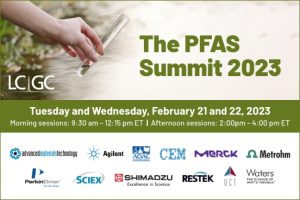Date/Time
Date(s) - Feb 21, 2023 - Feb 22, 2023
9:30 am - 4:00 pm
 The widespread presence of per- and polyfluoroalkyl substances (PFAS) in the environment, in food, and in the bodies of humans and other animals, is a significant concern. These persistent “forever chemicals”—which break down extremely slowly—have been used broadly since the 1940s. As certain forms of PFAS are restricted, they are simply replaced by newer forms, which continue to be used in a broad range of industrial and consumer products, such as food contact materials, water- and stain-repellent fabrics, and fire-fighting foams. To address this concern, the analytical chemistry community is actively developing advanced techniques and methods to detect and measure PFAS—including targeted methods that provide increased sensitivity and untargeted methods to detect the widest range of compounds—and to try to assess the connections between exposure, bioaccumulation, and health impacts. Join us for this interactive symposium—which follows on from our highly successful 2022 PFAS Summit—to learn about new techniques and best practices to tackle this serious problem and to ask your questions. We have a morning and afternoon session each day. There will be live Q&A for the morning sessions. Attendance is free.
The widespread presence of per- and polyfluoroalkyl substances (PFAS) in the environment, in food, and in the bodies of humans and other animals, is a significant concern. These persistent “forever chemicals”—which break down extremely slowly—have been used broadly since the 1940s. As certain forms of PFAS are restricted, they are simply replaced by newer forms, which continue to be used in a broad range of industrial and consumer products, such as food contact materials, water- and stain-repellent fabrics, and fire-fighting foams. To address this concern, the analytical chemistry community is actively developing advanced techniques and methods to detect and measure PFAS—including targeted methods that provide increased sensitivity and untargeted methods to detect the widest range of compounds—and to try to assess the connections between exposure, bioaccumulation, and health impacts. Join us for this interactive symposium—which follows on from our highly successful 2022 PFAS Summit—to learn about new techniques and best practices to tackle this serious problem and to ask your questions. We have a morning and afternoon session each day. There will be live Q&A for the morning sessions. Attendance is free.
Top Reasons to Attend
Who Should Attend
Anyone who wishes to learn more about developing or implementing analytical methods for the analysis of per- and polyfluoroalkyl substances (PFAS) in the environment, in food, or in biological matrices.
Katerina Mastovska, AOAC INTERNATIONAL, Rockville, Maryland, USA will speak on Tuesday at 11:00 AM on New AOAC INTERNATIONAL Initiative to Address Gaps in PFAS Analysis in Food